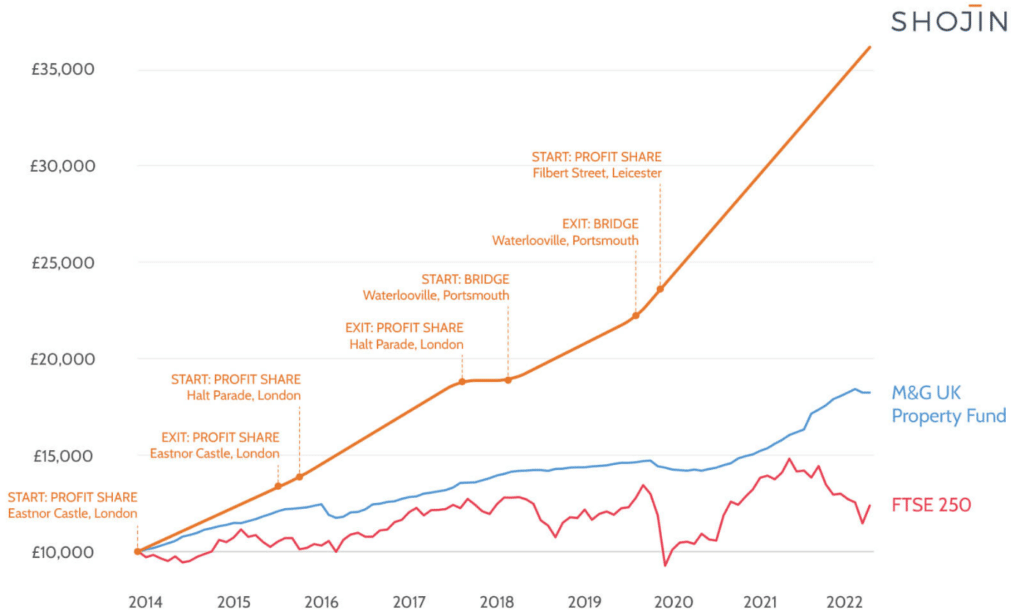In this article, we will assess the strengths and weaknesses of Shojin Property Partners. Let’s know more about the company first.
If you have been proposed this option and want a second opinion, you can email me (advice@adamfayed.com) or contact me here.
We can sometimes offer discounts, and other benefits, if you want to invest in it, compared to many other providers, or introduce alternatives which might be better for your situation.
Who is Shojin Property Partners?
Central London-based Shojin Property Partners is an investment firm that was formed in 2009 by Jatin Ondhia and Sandeep Puri. Ondhia, who is currently chief executive officer, formerly worked at UBS as investment banker for more than a decade.
The co-founders realized that there was a large untapped market for investors to participate in profitable real estate ventures in the UK market. Global investors are connected by Shojin with high-quality real estate investment prospects in the country.
Shojin Property Partners is composed of property and finance experts. It uses a co-investment approach in which its own funds are infused in a particular project along with money received from investors. So, the company only reaps profits when the project becomes a success.
Moreover, Shojin Property Partners gives investors the chance to enter the real estate market with clarity and ease by selecting from a variety of projects that each have their own unique risk profiles and timetables. Such projects are supported by a team of property professionals.
However, the investment options are not available to the general public and are instead made available only to select individuals who meet certain eligibility requirements.

Who can invest with Shojin Property Partners?
The firm does not take investments from the United States or any other nations that have been banned due to anti-money laundering regulations, but it does welcome investments from all other countries. There may be a small number of nations from which financial transactions cannot be accepted or initiated.
You must ensure that you comply with certain rules and regulations that are particular to your geographical location and citizenship, if you are a prospective investor from outside the UK.
You will have the choice to register as either an individual or a business organization when you go through the registration process. You may make an investment using either your business or a trust that you establish. For the purposes of Know Your Customer (KYC) regulations, you will be required to provide a separate set of papers, such as a company’s certificate of incorporation and articles of organization, depending on the option that you choose.
Shojin Property Partners also allows investments via the Self-Invested Personal Pension (SIPP) or the Small Self-Administered Scheme (SSAS).
How can you invest?
After you have completed your registration on the platform, you will have the ability to choose an offer in which you would want to invest.
If the offer qualifies for an Innovative Finance Individual Savings Account (IFISA), you will be provided with the option to make the investment either directly or via the IFISA. Just enter the amount you intend to invest and then follow the instructions that appear on the screen.
You can pay for your investment via a bank transfer. The instructions specific to your bank will be displayed on the screen and emailed to you. You can also infuse funds directly from your Shojin wallet if you already have money in there that have been cleared.
Investments via IFISA
IFISA is a new kind of ISA that gives investors the opportunity to obtain tax-free returns on certain profits they generate on investments that are qualified to be financed online. It allows you to invest in innovative finance products, such as peer-to-peer lending and crowdfunding.
These investments have the potential to offer higher returns than traditional savings accounts, but they also carry higher risks. They come together with conventional Cash and Stocks and Shares ISA.
To qualify for an IFISA, you ought to be at least 18 years old and a UK resident or a Crown employee stationed overseas, like a civil servant or military services, or the partner of such a Crown employee. In addition to it, you must present your National Insurance number.
It is easy to set up an IFISA account with Shojin. When you have finished the usual registration procedure, the only other piece of information you will need to hand over is your National Insurance number.
The Shojin IFISA are invested in on a project-by-project basis. Because of this, the rate of return you get will be contingent upon the kind of investment you go for.
While investment yields are tax-free, the tax treatment will vary depending on the specifics of each investor’s situation.

Is there a minimum amount needed to invest?
A typical investment in huge construction projects or buy-to-let properties involve a high sum to participate. This is not the case with Shojin Property Partners. Instead, you can access their property investment options with just 5,000 pounds.
What fees are assessed?
Instead of charging investors a management fee, Shojin Property Partners distributes a portion of the earnings among them. The standard cut given to Shojin is 20%.
They impose an upfront administrative fee equal to 2% of investor money to assist offset some of the transaction expenses. This is added to the project’s tab, so all your money will be invested.
What are the investment options / products?
Development Equity
Development equity is a main product investment of Shojin. They are often used by real estate developers that are in need of extra funding from sources other than banks and are content to split earnings with investors. Such products most often take the form of loans and are positioned in the financing structure such that they are subordinate to senior bank debt as well as any other debt. When a project has been finished, you are eligible to receive a portion of the earnings that it generates.
The development equity investment options offered by Shojin Property Partners might be just what you need if you’re the type of investor who could wait for a year to three years to realize your investment. This investment alternative is asset-backed as well so there is some form of security given.
This product has medium to high risk and investment returns depend on the specific project involved.
How does it work?
It is quite unusual for a bank or senior lender to provide a developer with a loan that covers one hundred percent of the complete development expenditures. As a general rule, it is limited at the mark of 70%, which indicates that a developer is required to shoulder the remaining 30%.
Here is where Shojin Property Partners’ investment approach comes into play, as the developer, the investors, and the firm itself all contribute to the funding of the remaining 30% of the project.
Development equity solutions allow investors to generate profits comparable to those of a real estate developer, as they cover a large portion of a project’s need for non-bank financing.
How does the firm secure this type of investment?
Because equity is a very risky position, Shojin Property Partners implements several safeguards, such as conducting thorough due diligence for every project, reaping profits only after a project is fulfilled and investors get their share, and taking the first hit in case of a loss since an investor’s equity is prioritized.
Mezzanine Loans
Shojin’s mezzanine loan solutions might be a good fit for you if you are looking for investments with fixed yields that are also backed by an underlying asset over a one-year to two-year timeframe.
Mezzanine loans are often used by real estate developers that want more finance for a building or development project, but do not wish to part with any of their existing equity and are content to assume a subordinate status in the funding structure. The loans normally endure throughout the entire project cycle and for up to three years. They are protected by a secondary lien on the estate, which will rank lower than the primary bank’s lien on the property.
This investment option has a medium risk, with investment returns in the range of 12% to 18%.
How does it work?
Mezzanine loans allow for increased leverage on a property or project by providing an additional layer of debt financing that is subordinated to senior debt but senior to equity.
In a real estate context, mezzanine financing typically involves a lender providing a loan to a borrower secured by a second charge on the property. The mezzanine lender is subordinated to the senior lender, which means that in the event of default, the senior lender will be repaid first before the mezzanine lender.
By adding a second layer of debt on top of the senior loan, the borrower can increase the amount of financing available for the project without diluting ownership or control. Mezzanine financing can be a useful tool for real estate developers or property investors who need additional funding to complete a project or acquire a property, but may not be able to obtain all the financing they need through senior debt alone.
Mezzanine debt can potentially allow developers to attain a higher return on their projects compared to bringing in equity partners, but this depends on the specific circumstances of the project and the terms of the mezzanine debt.
It is often cheaper than equity financing, which involves giving up an ownership stake in the project or property in exchange for funding. By using mezzanine debt instead of equity financing, developers can avoid diluting their ownership or control over the project. This can potentially lead to a higher return on investment for the developer, as they retain a larger share of the profits.
Additionally, mezzanine lenders may be willing to provide more flexible terms than equity investors, such as longer loan terms or more favorable repayment structures. This can also contribute to a higher return on investment for the developer.
Asset Investments
The variety of asset investment options offered by Shojin Property Partners makes it possible for you to pick between a steady stream of income income and/or capital appreciation based on the timelines and levels of risk that you are comfortable with. This provides you with the ability to diversify your portfolio across various properties.
These products are perfect for those who have been interested in conventional buy-to-let ventures in the past but now want to steer clear of the increasing complexity that comes with investing in this sector. Shojin offers investors an avenue to invest in real estate without having to manage the properties themselves, which is typical of buy-to-let endeavors.
This investment type has low risk. Investment returns vary depending on the type as you will see below.
Asset Investments Types and Returns
Standard
After deducting all of the property’s costs, you will be entitled to a portion of the remaining earnings when the property is eventually sold. In most cases, this may provide an annual income of 2% to 4% and capital growth of 3% to 6% per year, resulting in a combined annual return of 5% to 10% over the course of five years.
Capital Growth (equity)
This is an option for investors who are more interested in the potential for rising values than in receiving a consistent income from their investments. In most cases, this may generate 9% to12% on an annual basis over the course of five years. You also have the opportunity to obtain any additional income that is not handed out to investors classified as “income only.”
This product is best suited for taxpayers who pay a higher rate and who would rather not get income on which they incur income tax. Instead, they would rather benefit from capital appreciation and use their capital gains tax allowance.
Income Only (mezzanine)
Here, you may forsake potential capital gains in exchange for a regular monthly or quarterly payout. You may expect a fixed annual interest rate of between 5% and 7% with this.
This is a good option for taxpayers in the lower tax brackets who need a steady flow of money and are looking for a relatively low-risk investment. It is secured by a second lien on the property, which brings the total of the bank loan plus the mezzanine loan to 75% of the property’s worth.
Due to the higher priority placed on interest payments, this product has a lesser risk than development equity and mezzanine loan.
Bridge Loans
Bridge loans are short-term financing solutions that have terms ranging from three to 12 months. These are used by real estate developers as a provisional funding solution to hit strategic goals in the near term before the main line of financing is put into place. Bridge loans are typically protected by a first lien that is placed on the real estate.
For instance, a real estate developer may need a bridge loan when he is submitting an application for planning clearance for a property that he has acquired but is unable to get a conventional development financing. Alternatively, he may apply for a bridge loan, which, as the name implies, would provide financial support throughout the planning phase.
If the planning permit is granted, he will either refinance with development money or sell the site and pocket the profit from the increase in value caused by getting the planning license.
The risk of this investment alternative is low, with fixed returns of between 8% and 12% per year.
How does it work?
Shojin Property Partners’ bridge loans are secured by a first charge on the property, which means that the lender has a priority claim on the property in the event of default or foreclosure.
If the borrower defaults on the loan, the lender has the right to sell the property in order to recover the loan amount, interest, and any fees or costs associated with the loan, before any other creditors or parties with a claim to the property.
Having a first charge on the property provides the lender with a greater degree of security and reduces their risk, which may make it easier for borrowers to obtain financing at more favorable rates and terms.
The amount of the loan is normally up to 70% of the worth of the asset or building in its current form. The valuation is assessed by an accredited independent third party.
In most cases, the total interest rate that is attributable on the loan is subtracted from the loan funds that are advanced at the beginning.
Can you retrieve your investments if you change your mind?

Your initial investment as well as any profits will be returned to you after the project has already been finished; however, you will not be able to access your money until that time.
If you want to get out of a project early, you may put your investment up for sale on the secondary market, where you can negotiate a price with a possible buyer.
What if projects fall through?
In the event that the desired amount of capital is not raised, the company will make an effort to underwrite transactions and then refill those deals using its platform. But, if the project does not progress beyond the financing phase, then all of the funds that have been pledged by investors will be refunded to their Shojin wallet.
What are the pros of investing with Shojin Property Partners?
Transparency
Shojin Property Partners places a high value on transparency and strives to provide investors with detailed information about the investment opportunities available on its platform. This includes providing investors with access to due diligence reports, investment documents, and detailed financial projections for each project.
In addition, the investment company is transparent about its fees, which are typically charged as a percentage of the total investment amount. The platform also provides investors with regular updates on the progress of each project, including construction milestones and any changes to the projected timeline or financial performance.
Low investment minimums
Minimum investment amounts required for many traditional property investment opportunities can be prohibitively high for many individual investors.
One of the advantages of investing with Shojin Property Partners is that the platform offers relatively low minimum investment amounts, which allows a wider range of investors to participate in property development projects.
Due diligence
The due diligence process typically involves a thorough review of the project’s financial and operational performance, as well as an assessment of the project’s risks and potential upside.
The company takes a rigorous approach to due diligence to help ensure that the investment opportunities offered on its platform are of high quality and have the potential to deliver strong returns.
Shojin Property Partners also performs background checks on project sponsors and other key individuals involved in the project, to help ensure that they have a strong track record and the necessary experience to execute the project successfully.
Diversification
Investing in property development projects can offer diversification benefits by spreading your investment across multiple projects, potentially reducing risk. Shojin Property Partners offers access to exclusive investment opportunities that may not be available to individual investors without the platform.
What are the drawbacks?
Real estate market risks
Real estate investments in the UK (and elsewhere) are subject to market risks, which means that the value of the underlying properties can fluctuate based on a variety of factors such as changes in interest rates, economic conditions, and local real estate trends. This can impact the return on investment for investors.
Limited liquidity
Real estate investments are typically less liquid than other types of investments, such as stocks or bonds. It may be difficult to sell or transfer ownership of real estate investments quickly or easily, which can make it harder for investors to access their funds when needed.
Potential for Loss
As with any investment, there is a risk of loss with property investments. Even if a project is well-executed, there may be unforeseen events or circumstances that can negatively impact the venture, such as tenant defaults or natural disasters.
Moreover, investing in real estate projects through Shojin Property Partners may result in a concentrated portfolio of real estate assets, which can increase the risk of losses if one or more projects perform poorly.
Platform risks
There are also potential risks associated with investing through online real estate investment platforms, such as Shojin Property Partners. These can include the reliability and security of the platform, and the potential for technical glitches or downtime that could impact the ability to access or manage investments.
Furthermore, investments executed on the firm’s platform are not protected by the Financial Services Compensation Scheme (FSCS).
Taxes
You should be mindful of any potential tax implications that may arise as a consequence of any investments that you make via the platform. Your individual tax situation relies on your unique circumstances and may change in the future; thus, you are strongly encouraged to speak with adequately competent tax specialists about your individual tax status.
Pained by financial indecision?

Adam is an internationally recognised author on financial matters with over 830million answer views on Quora, a widely sold book on Amazon, and a contributor on Forbes.



